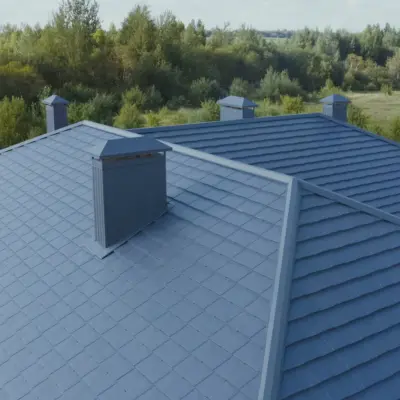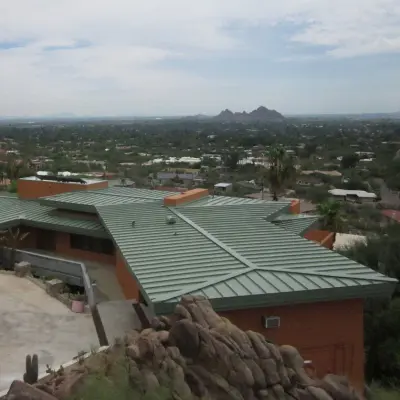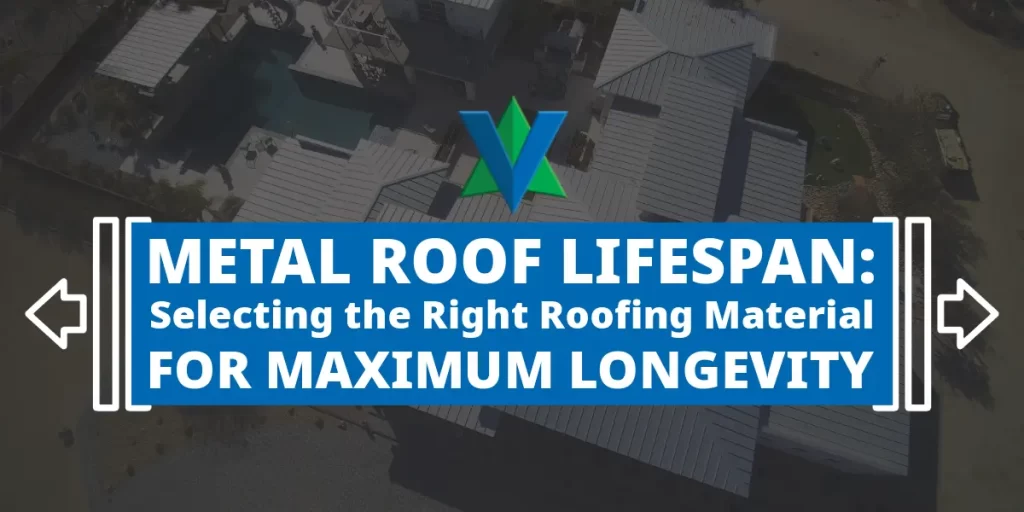Homeowners have many viable alternatives to roofing: asphalt shingle, slate, tile, cedar shake, metal, and others. Which option best suits your home? How do you decide between comparable choices? What outside factors or product features warrant the most consideration? How does an asphalt roof lifespan compare to a metal roof lifespan?
Does the expected longevity of a roofing material matter more than other aspects? For example, an asphalt shingle roof may cost less initially, but because it has the shortest lifespan of all materials, it winds up being the most expensive in the long run. A metal roof’s lifespan often extends beyond many other roofing alternatives, including asphalt shingle and cedar shake. Should that fact be an overriding consideration when evaluating a new roof?

The Expected Lifespan Of A Metal Roof Compared To Other Types Of Roofing
On average, a three-tab asphalt shingle roof lasts 5 to 12 years. If well maintained, an architectural asphalt shingle roof may last 10 to 20 years. Wood shakes offer an attractive aesthetic but require frequent upkeep, such as annual reconditioning to keep them from drying out. They may survive from 25 to 35 years. Clay or concrete tile roofing gives the homeowner 40 to 50 years of life before requiring replacement. However, these roofs require the underlayment to be replaced every 18-20 years and people often wind up buying new roofs at that point due to the broken tiles.
A metal roof delivers between 50+ years of life. In many cases, metal roofing is known to last over 100 years, especially if it is manufactured from highly durable materials, such as steel, aluminum, copper, or zinc. Although a homeowner may pay a premium at the front end to install a metal roof, they more than make up for the difference in cost savings on roof repairs and replacements.
6 Benefits Of Extended Longevity When Choosing A Metal Roof
Homeowners choose metal roofing because it offers many advantages, including a long lifespan. Consider the following benefits of metal roofing:
1. Highest Fire Rating Available
Fire ratings come in three classifications: A, B, and C. A Class C Fire-Resistance Rating reveals that roofing materials can only withstand light exposure to fire outside the home. A Class B Fire-Resistance Rating provides the ability to resist moderate exposure to such fire. A Class A Fire-Resistance Rating indicates that a roof will withstand severe exposure to an outside fire. By design, metal roofing delivers a Class A Rating. Homeowners can rest easy.
2. Highly Energy Efficient
Energy efficiency is a highly desirable roof feature. Homeowners appreciate a roof that reduces their energy (heating and cooling) consumption, resulting in tangible utility savings. Studies have shown that a metal roof will outperform other roofing materials and give energy efficiency benefits you just can’t get with an asphalt shingle roof.
etal roofing has naturally reflective properties. Thus, the sun’s UV and infrared rays will not easily penetrate through, or absorb past, the outer roofing surface. Most roofing materials, such as asphalt shingle or wood shake, don’t possess these same reflective attributes.
3. Ideal For Long-Range Ownership
Metal roofing may cost more upfront than other types of roofing that are temporary, such as asphalt shingles or cedar shakes. However, if you intend to live in your home for the rest of your life, or at least until your temporary roof needs to be replaced again, metal roofing may be the perfect solution! Metal roofing lasts for 50+ years or more. You won’t need to worry about saving personal finances to afford a roof replacement, which often costs tens of thousands of dollars and only increases over time.
4. Improved Property Value
Real estate professionals acknowledge that metal roofing provides tangible added value to a home. Industry experts suggest that a home’s market value increases 5-10% simply by adding a metal roof. Prospective homebuyers understand that metal roofing provides long-term durability and performance. Homeowners move an average of once every seven years, so installing a metal roof could outlast many homeowners.
5. Lightweight, Durable, and Impact-Resistant
Did you know metal roofing is less dense than almost any roofing material, including asphalt shingles and wood shakes? Consequently, metal roofing exerts far less pressure on a home’s structural integrity, which warrants meaningful consideration. Although metal roofing is lightweight, it exhibits qualities that demonstrate far greater durability than almost any other roofing material due to its superior physical, mechanical, and chemical properties.
6. Low To No Maintenance Required
Today’s homeowner is busier than ever. They don’t have the time, energy, or resources to invest in frequent maintenance and upkeep of their home’s roof. A metal roof offers the perfect solution for the on-the-go homeowner (and especially anyone who travels frequently or owns multiple residences). The physical properties of metal roofing essentially allow it to function as “self-cleaning.” Metal roofing is also far less susceptible to needing roof repairs. It is the only type of roof that is just as durable in year 20 as it is in year 1.
Identifying A Qualified Metal Roof Installation Professional
At Vertex Metal Roofing, we only install metal roofs. That’s it. Nothing else. We don’t dabble in the fine art of metal roofing systems. We write the book on it. If you live in Northern Minnesota, Greater Phoenix, or the Tucson Metropolitan Area, choose the metal roofing contractor that more residential homeowners trust.
Correctly installing metal roofing is not for the faint of heart, or the roofing contractor lacking the necessary qualifications and experience. Most roofing companies do not specialize in metal roofing, and few possess the knowledge and training to understand its unique intricacies, including how to install it accurately.
Contact Vertex Metal Roofing today to schedule an appointment and receive a free estimate.









